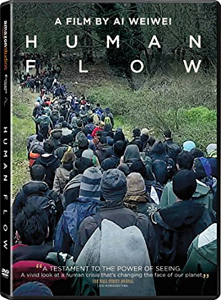 Human Flow (2018)
Human Flow (2018)
In July of 2015, after four years of house arrest in his native China, the dissident artist Ai Weiwei finally got his passport back. He immediately moved to Berlin as a refugee in exile. He thus brings his personal experience to the signature crisis of our age, namely, the 65 million refugees all around the world who have been forcibly removed from their homes. This documentary film is an excellent example of how sometimes images are far more powerful than words. There's very little narration, except for the intermittent facts, figures, and interviews with experts from places like Human Rights Watch and the UNHCR. To make the film, Weiwei gathered a team of 200 people that filmed in 23 countries. There's Lebanon, where a third of the population are refugees. Thirty million stateless Kurds. Over a million Syrians in Jordan, which would be the rough equivalent of sixty million refugees in the United States. But these are people, and not just numbers, and Weiwei lets his camera linger long on their faces and their stories, so that it becomes impossible to turn away from our fellow human beings. In 1989, when the Berlin Wall fell, there were 11 countries in the world with border walls and fences; today there are 70 such countries. And the last stop in this film? The Mexican — USA border, where a border patrol ludicrously shows the director where he can and can't film "for thirty minutes." I watched this film on Amazon Prime.


